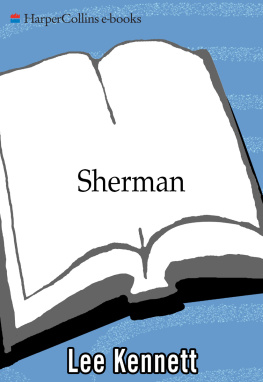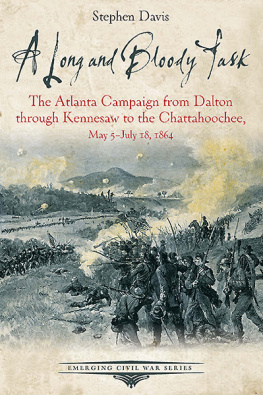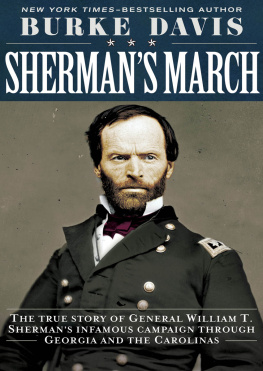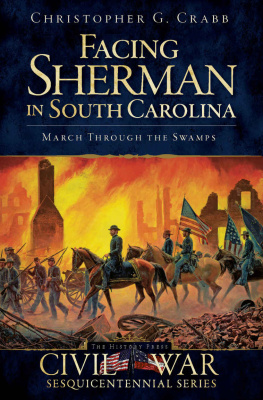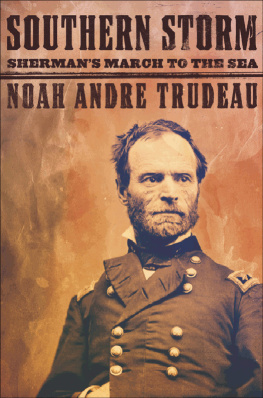To the people of Georgia, who made me welcome in their state for thirty years.
INVASION
1
Mise en Scne
On Saturday, April 30,1864, President Lincoln spent part of his day with his correspondence. He drafted several orders and directives and wrote three letters that we know of. Two of the letters are insignificant from the historians point of view; the third, though brief, is remarkable. Lincoln addressed it to Ulysses S. Grant, whom he had recently appointed lieutenant general and general in chief of all the Union forces. The letter was both an expression of confidence in the man and a carte blanche for his proposed campaign, to be set in motion within the week, for Lincoln knew the plan of campaign only in broad outline: The particulars of your plan I neither know nor seek to know. You are vigilant and self reliant; and pleased with this, I wish not to obtrude any constraints or restraints upon you. The president did have one concern. If there were to be reverses, he preferred them to be small ones that would not shake the peoples resolve or ruin his partys chances in an election year: I am very anxious that any great disaster, or the capture of our men in great numbers, shall be avoided. Having deftly inserted this word of caution, Lincoln wished his general in chief Godspeed: And now with a brave Army, and a just cause, may God sustain you.
This expression of confidence was remarkable considering the doubts and disappointments the president had known with commanders he had previously sent into the field. But in Lincolns eyes Grant had the qualities now needed for command: He could be counted on to push the campaign along relentlessly and grind away at the enemy as long as the South continued to resist. It was a costly and uninspired way of winning a war, but it seemed to be workingalbeit slowlywhere nothing had worked before. A certain momentum had been built up that Grant would sustain. The Rebel invasion of Pennsylvania had been handsomely beaten back at Gettysburg; Grants own victory at Vicksburg had sundered the Confederacy along the line of the Mississippi; then too, Tennessee, Kentucky, the western part of Virginianow called West Virginiaand portions of other rebellious states had fallen to the Union army. But if the scale had clearly tipped in the Norths favor, after three years of war the core of the South had not been pierced, and large Rebel armies were still intact; there was much work to be done.
A hundred miles to the south in Richmond another president sat in another executive mansion on that same Saturday, and his mind too was on the coming campaign, for Jefferson Davis had to prepare a message for the opening of the Second Confederate Congress, set for the following Monday, and there he would have to lay out the prospects for the coming campaign. His work was interrupted that afternoon by tragedy; his five-year-old son, Joseph, fell to his death while playing on the balcony of the Confederate White House. For a time Davis was as if stunned, unable to write and barely able to speak. But drawing on an inner strength, the stricken president finished the drafting of his message and delivered it as scheduled.
It was a somber document. On the diplomatic front the president could find no encouraging news, no hint that either Britain or France had moved closer to recognition of the Confederacy, much less intervention on its behalf, and he confessed that he saw no prospect of an early change. In the recent fighting there had been some minor successes in North Carolina and Florida; the Federal forces seemed completely balked in their effort against Charleston. Confederate forces in the transMississippi Davis scarcely mentioned. Speaking of the two great armies the Confederacy still maintained east of the river he said: The armies in northern Georgia and in northern Virginia still oppose with unshaken valor a formidable barrier to the progress of the invader. Davis thus cast the two armies in the role of shields, essentially defensive. Some of the lawmakers may have shaken their heads as they recalled the situation just a year ago, when the Army of Northern Virginia was winning a dazzling victory at Chancellorsville and opening the door to invasion of the North. If Lincolns watchword was perseverance on the exhausting road to victory, Davis seemed to be saying that as long as they endured they had a basis for hope. Perhaps the Second American Revolution, as some called the Southern cause, could be won the same way the first one had been: Their opponents, for all their superior resources, would finally decide the game wasnt worth the candle.
It would not have been possible for Davis to draft the kind of letter Lincoln sent to Grant; it accorded neither with his conception of the office he held nor with his appreciation of his own abilities. And in a sense Davis was far more qualified for the supreme direction of war than Lincoln was: The Confederate president had commanded a regiment in the Mexican War and had served with distinction as secretary of war in the Pierce administration, while Lincolns previous contact with the military was as a militia captain in the Blackhawk War. So though there was talk of creating a Southern general in chief, the president was cold to the idea; he himself had largely assumed that rolewith indifferent results, due in large part to his own flaws in character and judgment. Recently Davis had had a particularly frustrating exchange with General Joseph E. Johnston, commanding the Army of Tennessee. Davis believed that Johnston had the resources and the opportunity to launch an offensive against the Federal forces in Tennessee and tried to prod the general forward; Johnston resisted, saying he did not have the means. The exchange was not a frank and open one on either side. Davis relied on other, confidential sources of information about the state of Johnstons army, notably General John Bell Hood, a close friend of the president and one of Johnstons corps commanders. Johnston was a man of prickly sensibilities (he once returned an important letter from the secretary of war because the secretary had inadvertently failed to attach his signature); resenting what he considered an intrusion on his authority, he put up one argument, then another, or simply failed to respond. Thus the Confederacys western army, like the one in Virginia, entered the month of May waiting for the enemys initiative. Neither army would have long to wait.
General Grant had hastily put together a plan of campaign after his appointment as lieutenant general and commander of all the Union armies on March 9; he conferred first with General George Meade, who would continue to command the Army of the Potomac; then, after a brief stop in Washington to speak with Lincoln, Grant headed west to see General William T. Sherman, who would direct the Union effort in the vast Military Division of the Mississippi. The two friends had both made their reputations in the West, and they spent considerable time discussing what should be done there. Since Grant would be returning soon to the East where he could be at Meades elbow, he and Sherman would have contact only by mail or telegraph, so they tried to cover all the problems and opportunities that might arise in the West. Their deliberations stretched over three days, ending with a long session in a mapstrewn Cincinnati hotel room.
The plan they agreed upon was a simple one. Grant believed that earlier campaigns had often come to grief because the eastern and western armies had not established a harmony in their efforts; in Grants phrase they had been like a balky team. The Confederates had profited from this discordance by shifting troops to one theater, then to another, as need arose or opportunity presented itself. Now both Union armies would begin operations simultaneously (Grant later fixed the date as May 5), and thereafter maintain a strong and unrelenting pressure for as long as it took to topple the Confederacy. There were no timetables or deadlines, no complex schemes for combined operations. Each of the two Union hosts would have an opposing army to defeat and, they hoped, to destroy, and a city to take. Grant would drive for Richmondhe had already pledged to Lincoln he would take it if given enough menand Sherman would push toward Atlanta.


